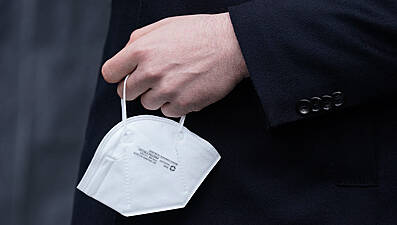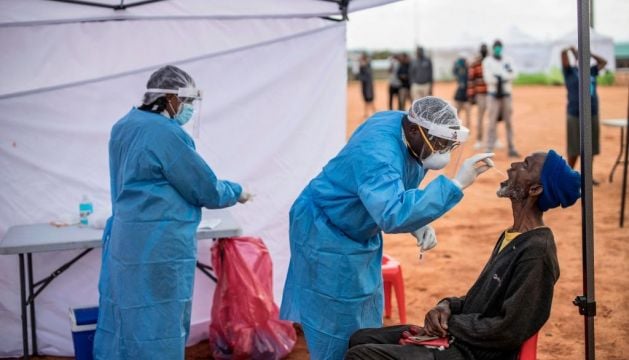The World Health Organization has designated the new Covid-19 variant detected in South Africa with many mutations as being "of concern," the fifth variant to be given the designation.
The WHO said in a statement that it had assigned the B.1.1.529 variant the Greek letter Omicron.
Authorities around the world have reacted with alarm to the new variant, with the EU and Britain among those tightening border controls as researchers sought to establish out if the mutation was vaccine-resistant.
Hours after Britain banned flights from South Africa and neighbouring countries and asked travellers returning from there to quarantine, the WHO cautioned against hasty travel bans.
"It's really important that there are no knee-jerk responses here," said the WHO's emergencies director Mike Ryan, praising South Africa's public health institutions for picking up the new variant of the virus that causes Covid-19.
"Because we've seen in the past, the minute that there is any mention of any kind of variation, then everyone is closing borders and restricting travel."
Vaccine effectiveness
The WHO said it would take weeks to determine how effective vaccines were against the variant.
South Africa's health minister Joe Phaahla called the travel restrictions "unjustified", though he also said preliminary studies suggested the new variant may be more transmissible.
European Commission chief Ursula von der Leyen said the EU also aimed to halt air travel from the region. Several other countries including India, Japan and Israel toughened curbs.
"It is now important that all of us in Europe act very swiftly, decisively and united," von der Leyen said. "All air travel to these countries should be suspended until we have a clearer understanding about the danger posed by this new variant."
The United States will restrict travel from South Africa – where the new mutation was discovered – and neighbouring countries effective Monday, a senior Biden administration official said.
Top US infectious disease official Anthony Fauci said there was no indication that the variant was in the United States. It was unclear whether it was resistant to current vaccines, he told CNN.
The news pummelled global stocks and oil, which plunged 10 per cent, on fears that new restrictions would hit the travel industry and already shaky economies across southern Africa.
'Most significant variant'
The variant has a spike protein that is dramatically different to the one in the original coronavirus that vaccines are based on, the UK Health Security Agency said, raising fears about how current vaccines will fare.
"As scientists have described, (this is) the most significant variant they've encountered to date," British transport secretary Grant Shapps told Sky News.
In Geneva the WHO – whose experts on Friday discussed the risks that the variant presents – warned against travel curbs for now.
It would take several weeks to determine the variant's transmissibility and the effectiveness of vaccines, WHO spokesperson Christian Lindmeier said, noting that 100 sequences of it had been reported so far.
British health minister Sajid Javid said the sequence of the variant was first uploaded by Hong Kong from someone travelling from South Africa.
"It is highly likely that it has now spread to other countries," Javid told lawmakers.
South African scientists suspect the sudden spike in infections in the country is linked to the new variant, but it is not clear how far it has spread beyond its borders.
Belgium identified Europe's first case, adding to those in Botswana, Israel and Hong Kong. Denmark has sequenced all Covid-19 cases and found no sign of the new mutation, Danish health authorities said on Thursday.

Israel imposed a travel ban covering most of Africa.
"We are currently on the verge of a state of emergency," prime minister Naftali Bennett said in a statement. "Our main principle is to act fast, strong and now."
Brazilian health regulator Anvisa recommended that travel be restricted from some African countries, but president Jair Bolsonaro appeared to dismiss such measures.
Bolsonaro has been widely criticised by public health experts for his management of the pandemic, railing against lockdowns and choosing not to get vaccinated. Brazil has the world's second-highest death toll from the virus, behind only the United States.







